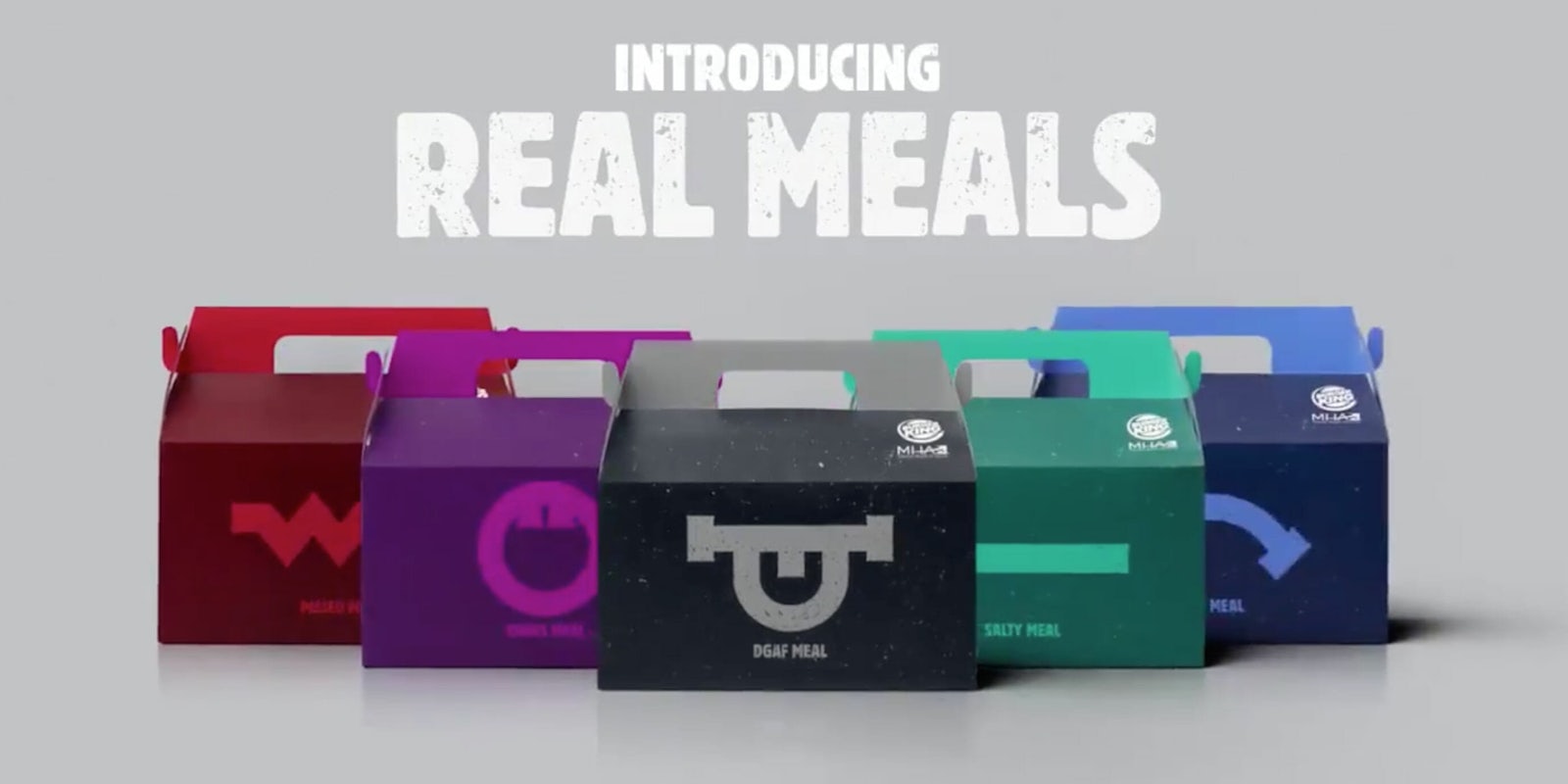Burger King this week released an ad addressing mental health. It’s been divisive and attacked online for tone-deaf qualities. It’s also prompted many on Twitter to ask how the burger giant treats its own labor force.
The campaign, produced in partnership with Mental Health America (MHA), was released on Wednesday, kicking off Mental Health Awareness Month.
it’s ok to #feelyourway pic.twitter.com/JiMDnzWCaI
— Burger King (@BurgerKing) May 1, 2019
The ad features everyday struggles of people—from a man feeling low in his bedroom, to a high school student feeling bullied in school, a working woman angry at her boss, a young man anxious about having to pay student loans, a young man ghosted by a date, and a young woman feeling judged for likely being teen mom.
“Not everybody wakes up happy,” the ad starts off with the man in his room saying. “Sometimes you feel sad, scared, crappy. All I ask is that you let me feel my way.”
Suddenly, they all sing “all I ask is that you let me feel my way,” each in a triumphant moment of owning their feelings.
“No one is happy all the time. And that’s OK,” the ad reads, showing the different “emotions” attributed to the meals in their range: Blue meal, YAAAS, pissed, salty, and DGAF, which is when the burgers finally become relevant in the ad, and the hashtag “#FEELYOURWAY” is introduced.
Some people initially seemed to enjoy the offbeat ad.
I haven’t been to Burger King in years…but if you think I’m not chomping at the bit to order a idgaf meal…you don’t know America #feelyourway
— ChipHooWah (@ChipHooWah) May 2, 2019
https://twitter.com/CGarciaalba/status/1124066797953720320
But most expressed their reservations about the ad potentially trivializing mental health. Many asked how supportive Burger King is about its own employees getting mental health support—or being paid enough to get mental health support:
https://twitter.com/ira/status/1124047144187510791
if burger king wanted to do something about mental health problems they could pay their workers more. https://t.co/Cjiged0PvT
— Paul E. Cheesesteak (@paulbensonsucks) May 2, 2019
https://twitter.com/Bahguette/status/1123981597198430217
So I guess I want to ask @BurgerKing is what they’re doing for the mental health of their employees. Are they getting access to free/low-cost counseling? Is there healthcare? A living wage? A clear channel to report harassment? Paid sick leave? Or just boxes for the ‘gram? https://t.co/QyX8ilaf5k
— Kat Kinsman (@kittenwithawhip) May 2, 2019
Financial stress has previously been linked to depression and with Burger King paying workers a minimum wage of $8.26/hour, a little over the national average, the optics for the fast-food chain were easy to call out on Twitter.
According to a job posting on Glassdoor, the company advertises medical, vision, disability, life, and travel accident insurance to “eligible employees.” It doesn’t mention mental health, and even with the insurances it does offer, past and present employees have left poor reviews about the limitations of Burger King’s coverage.
Burger King: We care about mental health
— My Ancestor’s Legacy (@myancestorsbaby) May 2, 2019
Burger King employees: pic.twitter.com/FdSz85V4tV
https://twitter.com/BettyBowers/status/1124048423928455168
BK Employee: “Hey boss, I need an extra day off to go see my therapist.”
— Toast (@DorkToast) May 2, 2019
BK Manager: “Either you work the hours you’re scheduled or you’re fired.”#truestory #feelyourway
feeling down? come to burger king where we pay our employees $8.70 an hour. we definitely care about mental health and this isn’t a cheap ploy to appear “woke” https://t.co/RgcCtNNwnM
— jordan (@JordanUhl) May 2, 2019
if burger king wanted to do something about mental health problems they could pay their workers more. https://t.co/Cjiged0PvT
— Paul E. Cheesesteak (@paulbensonsucks) May 2, 2019
And many expressed other reservations.
https://twitter.com/neroscaeva/status/1124064086826921985
https://twitter.com/Iamujer_/status/1124207570032316416
https://twitter.com/cottoncandaddy/status/1124048895892439051
Just punched a hole in my wall thinking about all the money I could have saved last year by just having Burger King instead of having to go to the psychiatric hospital
— grace spelman (@GraceSpelman) May 2, 2019
https://twitter.com/kayjovah/status/1124043769404379142
And like with everything on Twitter, there were a fair number of jokes about the ad:
https://twitter.com/CohenChicken/status/1124172856450060291
burger king just did a $100 billion ad campaign to tell us theyre putting piss in the food now when i tell people that for free every day
— wint (@dril) May 2, 2019
https://twitter.com/rudy_mustang/status/1124047742815342592
Especially from Pornhub, which replied with a dry “This aint it chief.”
This aint it chief.
— Pornhub (@Pornhub) May 2, 2019
Fyi you don’t need an ad campaign to tie Burger King to depression https://t.co/iSQVEF7zwt
— Chase Mitchell (@ChaseMit) May 2, 2019
https://twitter.com/arb/status/1123988884742975488
hi yes burger king? i’ll have the “can’t satisfy a woman” whopper and a large fry. thanks. thanks for understanding.
— Law Boy (@The_Law_Boy) May 2, 2019
The MHA, ahead of the ad’s release, expressed excitement with the campaign. “While not everyone would think about pairing fast food and mental health, MHA believes in elevating the conversation in all communities in order to address mental illness Before Stage 4,” the MHA said in a statement on its website. “By using its internationally-known reputation to discuss the importance of mental health, Burger King is bringing much-needed awareness to this important and critical discussion—and letting its customers know that is OK to not be OK.”
The packages are available in only five stores across the country—in Los Angeles; New York City; Austin, Texas; Miami; and Seattle, according to the MHA website.
Color-coded burger boxes, no matter how cute or inclusive of different emotions, will likely not cure depression or anxiety. Burger King did not immediately respond to the Daily Dot’s questions.
READ MORE:
- Influencer Casey Neistat rips Burger King for exploiting him
- Budweiser and Burger King are trying to make ‘whassup’ a thing again because we’re living in hell
- Burger King trolls Ajit Pai with net neutrality ad


